During the COVID-19 pandemic, the county of San Diego temporarily housed people with pre-existing medical conditions who were in need of a safe place to shelter at hotels managed by Equus Workforce Solutions. At the start of 2022 the county began to wind the program down. County staff and contractors who were running the hotel were supposed to help guests find permanent housing before they had to leave, but in the final weeks of the program dozens of guests at the hotels were still without a place to live. According to San Diego County, in total, 115 guests left the hotel program into permanent housing. 61 left with a bed at a shelter and six went into other programs. Seventy “self resolved” to unspecified locations.
Starting in 2021, inewsource photojournalist Zoë Meyers followed guests as they left the hotel and as they looked for permanent housing. She witnessed some of the obstacles that keep people from getting into housing and also what helped. She saw the stability that a permanent home can bring someone and also the cycle of instability that can result without one. As San Diego attempts to help a growing community of people experiencing homelessness this intimate look into the lives of those seeking homes can help us move in a more informed way toward solutions.
Coming next week: San Diego County spent more money on security guards than on food for residents quarantined at the Crowne Plaza hotel, and two food vendors had recent health violations, an inewsource investigation found.
Susan

Susan Hauck is one of a small number of residents who was given a new hotel voucher after the county’s hotel sheltering program ended.
She became unhoused around 2019, after her son died and she could no longer afford the rent for her home on her own. “Along with grieving my son and everything else that came along, it’s been really hard for me,” she explained.
“You know, everything always happens all at once.”
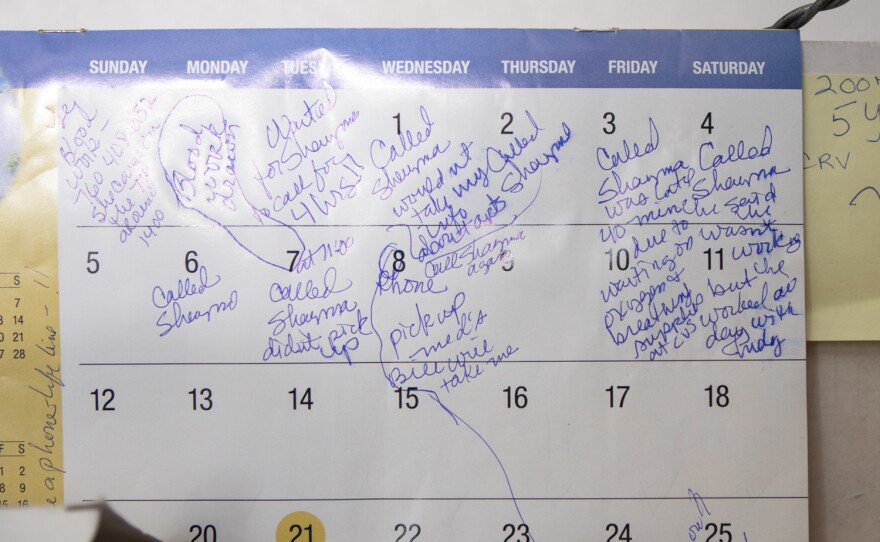
Susan was living in her car before she was sheltered in a hotel room through a different program. While staying there and later at the county run hotel she suffered from a series of falls that landed her in the hospital. For now, she still relies on the use of a motorized scooter for mobility. The new hotel room she is in is not fully accessible with her scooter, and she worries about falling again when she has to hoist herself from the scooter into the bathroom.
Susan has been trying to get an apartment in Oceanside, where she used to live, but so far has not been able to find a place. She says the first unit she applied to she didn’t get because of an administrative mistake made by her case manager at Equus. That failure she said was a huge disappointment, “I lost it and to lose a place after you try and find it, that’s devastating because it’s very hard, like I said, to get it.”
Bill and Shera

In 2020 Bill and Shera Beem lost their trailer home in the Valley Fire, which burned through the property they were renting in Jamul. They said they were in the process of getting the trailer insured when it burned down and were left with no home and no savings after the fire.
In February 2021, they were given a room at a county hotel, but with the end date of the program nearing in the spring of 2022, they still had not found a permanent home to move into. At the suggestion of his housing case manager Bill started searching for spaces at single room occupancy (SRO) hotels in downtown San Diego and hoped his wife could get into an assisted living facility because of her health condition.
Bill discovered that in San Diego even SRO’s are hard to come by. On one afternoon he drove around downtown moving through a list of SRO’s provided to him by his Equus caseworker. The first was listed at $1,190 a month but had no vacancy and no waitlist. The second address listed was incorrect and left him knocking on the door of a restaurant in the Gaslamp Quarter. He was soon worn down with frustration and the stress of burning through gas while looking for parking spaces.
When he got back to the hotel he was on the verge of tears, feeling depressed and concerned that he and his wife would have to leave the hotel with no place to go. “I worry about our life. [If] we get kicked out tomorrow, my wife won’t make it,” he said.

In May, Bill and Shera were accepted for an apartment in Mission Valley and were able to move in two days after the hotel closed. Shera’s Section 8 voucher will cover the cost of their rent. They will need to rely on Bill’s social security payments to pay for their utilities and other living expenses.
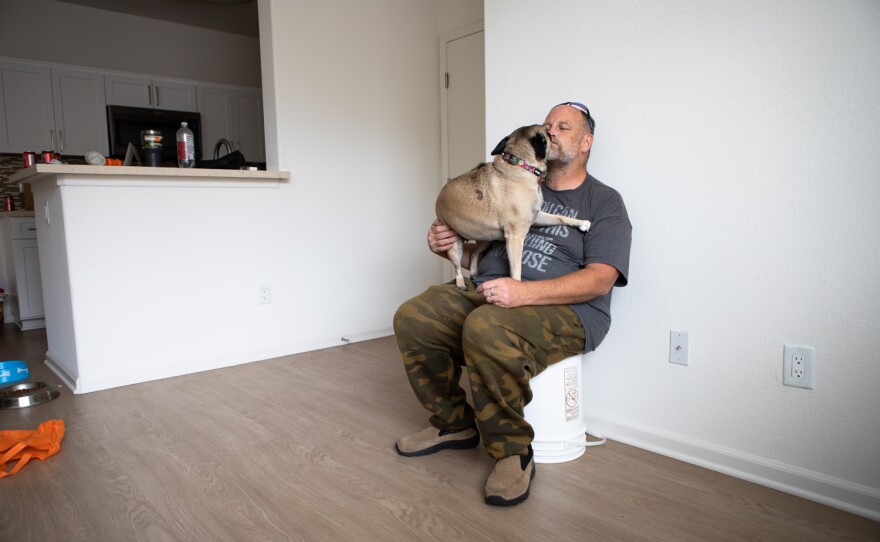
On the day they moved in Bill felt “content” but also scared. He explained, “Shelter – shelter means you’re hiding behind a fixed purpose. There was no program to help us to advance out into the world of budgeting and all of that stuff that now we have to face.”
He and Shera quickly got to decorating and setting up their belongings to make the apartment feel like home. Bill said, “It’s not filled up yet. There’s no love, yet. So that’s what we want. We want to fill it with love and joy.”
Arley

Arley Adcock was one of a small number of hotel guests who was given a new hotel voucher when the temporary sheltering program ended. He first became unhoused in 2019, after his parents, who he had been taking care of in their home, died. His fianceé, who he was in a relationship with for 13 years, and three close personal friends died around the same time. The year before he had lost his job after an injury disabled his back. “I lost everything,” he said.
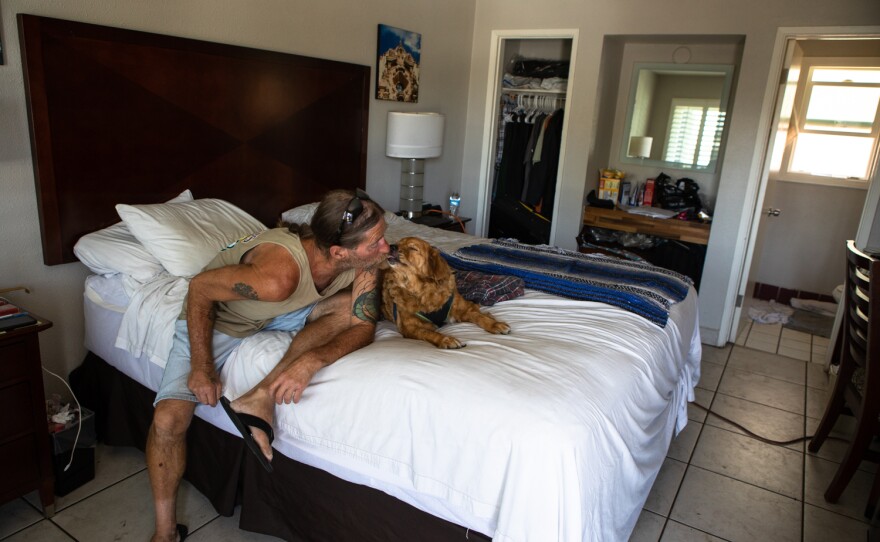
As of July, he has been applying for apartments from his new hotel room but so far hasn’t had any luck in finding one. In previous housing applications he said he was denied because of his income and lack of credit. His housing case manager emails him unit listings to apply to but often there are stumbling blocks in the rental applications. “It’s just one big disappointment after another,” he said.
Although the shelter of the hotel is an enormous help, with his health conditions, there are still many challenges to living out of a hotel room. Arley continues to suffer from severe back pain and is recovering from major abdominal surgery. He is also diabetic. “I’m still having to depend on food stamps and a microwave…and I’m diabetic, so it’s not like I can always just heat up a meal” he explained.
Shorty

Thedford “Shorty” Sypho moved into his apartment in Otay Mesa on May 18. “It’s a blessing for me to be here and have an apartment,” he said on the day of his move in.
Talking about the weeks leading up to his move, Shorty explained that he wasn’t sure it was going to work out. “It was like a rollercoaster ride. You stay stressing over what it is. Are you gonna get it? Are you not gonna get it? Are they doing what they’re supposed to be doing? It was a lot of stress.”
He is concerned about how he’ll adjust to the location of the apartment. Shorty doesn’t have a car and his apartment isn’t accessible to public transportation. He doesn’t know anyone in the area.
Overall though, he said, “I’m overjoyed, because I could be living on the streets. And that ain’t no kind of life. I don’t get no enjoyment out of living on the streets, just another way to survive, but I don’t get no joy out of living on the streets.”

Bonnie

After staying at a county hotel during the pandemic, Bonnie Caret was asked to leave with the closure of the hotel program at the end of May. She turned down an offer for a shelter bed and instead stayed with friends until she could get her car repaired and return to a Jewish Family Services safe parking lot. After spending a year isolated at the hotel where she explained, “I wasn’t even allowed to have my friends”, she didn’t feel prepared to move into a shared room at a shelter.
The safe parking lot is the same place she was staying in 2021 before she moved into the hotel. Bonnie is re-adjusting to living out of her car, “[I’m] trying to figure out how to do this again.”
At 64 she adds, “It is because of my age too, because I’m over a year and a half older, and you know, with every year that you get older, after a certain age, it’s just harder. Things just get harder.”

Naomi
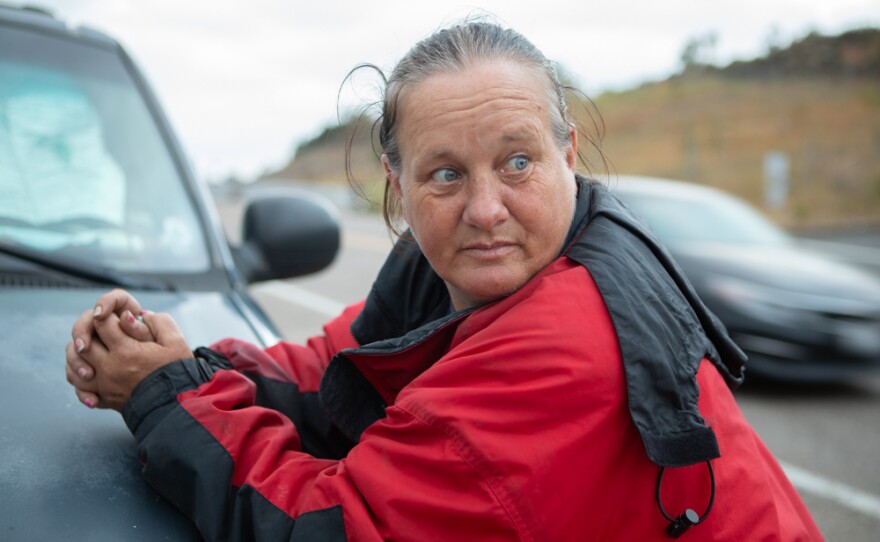
Naomi Flynn spent about five months staying at a county run hotel before she was given a notice to vacate in May 2021. She says the notice came after she was involved at an altercation at the hotel.
Since then she’s been living in her 2002 Ford Expedition with her 8-year-old Shar Pei pitbull. Living out of her truck has been especially difficult because of her health condition. She has congestive heart failure and takes medication that requires her to stay out of the sun. “My health is in bad shape,” she explained. Naomi did leave the county hotel with a Section 8 voucher, but she’s worried it will soon expire without finding a place to live.
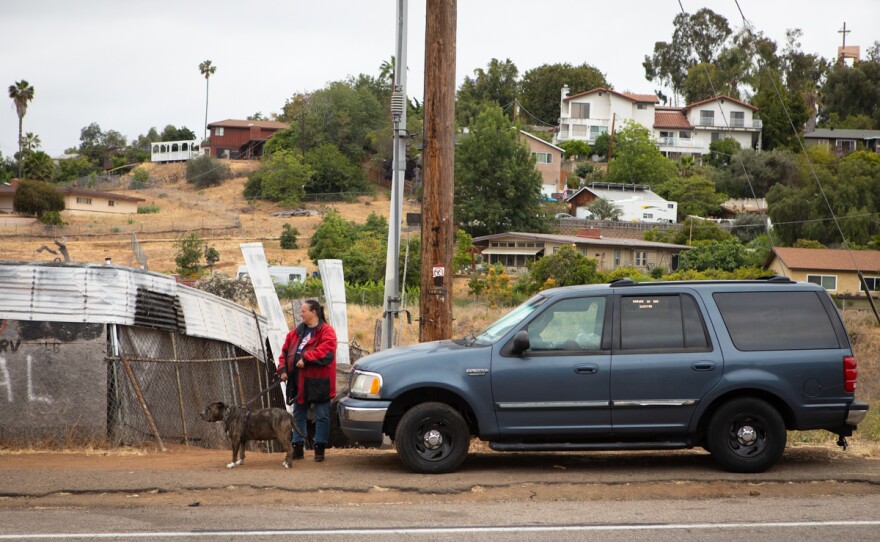
Linda

When Linda McDowell received her Section 8 housing voucher this spring she quickly started looking and applying for apartments. Unfortunately, her previous rental history became a stumbling block in the already difficult process of finding a place to live.
After touring an apartment near San Diego’s seaport village in early May, Linda was overcome with excitement thinking about the possibility of living there. “It’s gonna be so nice, it’s so close to the water!” she said as she parked next to the building. “I could just walk outside and be on the water. Look at this! Ahhh!”
After scrambling to get money for her rental application and a holding fee Linda received bad news from the leasing agent. A rental screening had turned up her previous eviction and rental balance.
“I just don’t know what to do,” she repeated over and over while processing the news. “My heart hurts.”

After the initial let down and fear of not getting the apartment Linda was able to fully complete the application with additional information the leasing agent needed. She moved into the apartment later in the month.

Chris

Chris was given a bed at a homeless shelter run by Father Joe’s Villages when he left the county run hotel in May. He did receive a Section 8 housing voucher while at the hotel but because of his credit score was rejected for an apartment he applied to. As the deadline to move out of the hotel rapidly approached, his case manager at Equus had difficulty finding units that matched his voucher and were also ADA accessible.
In 2018 Chris was severely injured in a motorcycle accident, and he now relies on an electric scooter for mobility. The accident changed his entire life. He lost his job and marriage afterward and later became unhoused.

After leaving the hotel Chris stayed at the shelter for a few nights but left because he felt unsafe. For about a month Chris lived on the street, his days often filled with the logistics of packing and unpacking his tent and moving his belongings into storage all while attempting to keep his scooter charged.
At first Chris slept near his storage unit but then moved to a different area where a friend was living. Because his friend was there, he felt that he could leave his tent up during the day and not worry about it being stolen. He added, “It’s better if you have people that you know, plus you have someone to talk to. If you don’t have anybody to talk to, it’s depressing.” Looking toward his service dog Bobo he said, “You can only talk to your dog so much before he just finally just stares at you and goes, dude, I don’t understand what you’re saying.”
One morning he woke up to the news of a notice to vacate the sidewalk from the city. He needed to remove his belongings within three hours.
He said the experience, “is a little nerve wracking because we all try to make these feel like- because it is our home – so we try to make it feel like our home.”
Chris had less to move than others who had been staying in that area for weeks, but he had taken some things out of his storage unit to have with him in his tent. “I wanted to have certain things here that make me feel comfortable. Like, I still had a home,” he explained.


At the end of June the local nonprofit Housing 4 the Homeless placed Chris in a hotel room while they began to assist him in finding a permanent home. Chris says he was immediately relieved to be off the street. When he first arrived he said, “I just laid down on the floor in the room, while this guy is still making my bed. The AC was on, so the floor just being so cold, but evenly flat, it felt better than a bed because I’ve been sleeping on the side of the freeway in a slant and there [were] pebbles and rocks and dirt.”
In mid-July, Chris moved to a transitional non-congregate housing shelter where he will continue to receive assistance from PATH and Housing 4 the Homeless in finding permanent housing.


Allan

Jeffrey Allan Russell stayed at hotels in both the county’s COVID isolation program and sheltering program for five months in 2021 before he left one of the hotels. Allan is a 78-year-old Army veteran and suffers from Parkinson’s disease. Inewsource reporters were unable to verify why he left the program and where he went immediately afterward.
One night this June, Amie Zamudio, the outreach director at Housing 4 the Homeless, received a call from a resident in Pacific Beach. They had found Allan stuck in a ditch in his wheelchair along the side of the road.
Amie placed Allan in a hotel room where he stayed until the first week of July when was admitted to the San Diego VA Medical Center in La Jolla. After a couple days at the hospital he was discharged and soon found in distress at a trolley station by a UCSD student. Amie searched for Allan for several days but was unable to find him.
On July 15, inewsource photojournalist Zoë Meyers found Allan in a shopping center near the San Diego VA Medical Center in La Jolla. He was sitting in his wheelchair in disposable hospital pajamas and screaming for help. He needed someone to move him out of the sun and into the shade.

He talked a little about his experience over the last few days. Describing Parkinson’s disease he said, “That’s what I have. I can’t remember the name sometimes. Words slowly fade away.”
When he talks he said, “It’s a shout or nothing. Nothing in between.”
Allan had been readmitted to the San Diego VA Medical Center on July 12 under a 5150 hold and was discharged again on July 14. He said he slept at a nearby bus stop after being discharged.
Housing 4 the Homeless was unable to find a hotel room for Allan. A case worker from San Diego County Aging and Independence Services said she would try to make contact with him, but since he had previously refused services from her there was little she could do. Photojournalist Zoë Meyers ultimately had to leave Allan with some food and water at the bus stop. As of Wednesday he was a patient at another San Diego County hospital.

Wayne
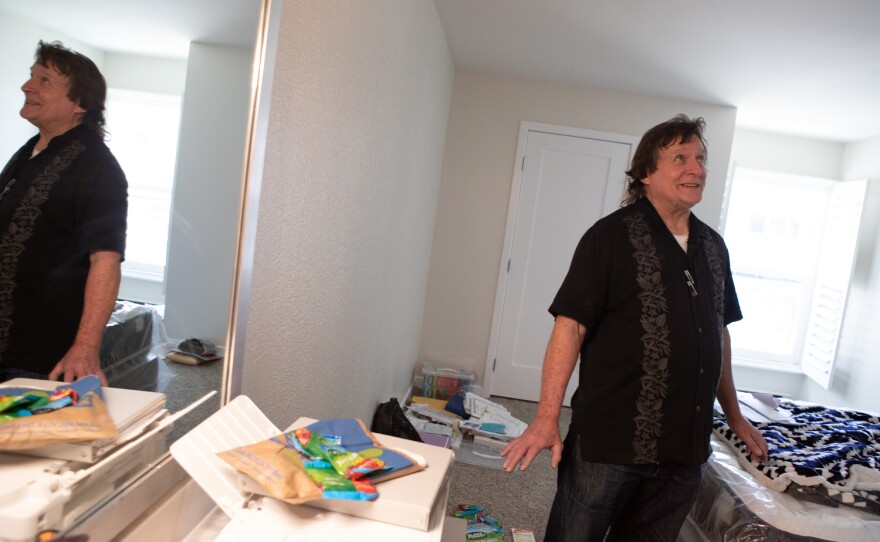
Wayne Harris had been staying at a safe parking lot run by Jewish Family Services since 2019, before he was moved into the county’s temporary sheltering program during the pandemic. Safe parking and the hotel are programs he says he is “very grateful” for. Both programs offered him relief from living on the street. Thinking of that experience he called it: “survival mode 24-7 because it’s noise, it’s police, it’s businesses. It’s – it’s everything. You have no place really to go that’s safe.”
With assistance from a Section 8 housing voucher for San Diego County Wayne was able to move into a 1-bedroom apartment in Coronado. Having a place of his own is something he said he hoped would happen but never expected, “It’s a miracle in my wildest dreams.”
Wayne has some friends who were in the hotel who didn’t get into housing, which he says he’s sad about. He thinks people working at the hotel could have done more to reach out to guests they hadn’t heard from. Reflecting on one friend he said, “I know they were busy but I feel it’s people like her that really need the help because they struggle. They’re nervous, they’re scared. And sometimes it just gets in the way until someone can kind of be coaxed along to get started.”
He also knew people who were kicked out of the hotel program and said, “I just feel sad because there were some in the beginning that were kicked out who really needed that hands-on thing, who struggle with coping in society because of things that have happened to them.”

William

William Morris and his wife Martha were first offered a room in a COVID-19 isolation hotel after Martha tested positive for COVID-19 in November of 2020. They had been living out of their car for three-and-a-half years. Upon arriving at the hotel William said he immediately faced harassment from security guards and reported one physical confrontation to Equus. Reflecting on the way he was treated he said, “I wouldn’t put my worst enemy in a place like that.”
William and his wife were later moved to a different hotel to shelter until they could find permanent housing. From there William was able to move into an apartment at St. Teresa of Calcutta Villa after he and Martha separated. He received a Section 8 voucher which pays a portion of his rent. Part of his disability check also goes towards his rent.


He said the apartment and the location are beautiful and he enjoys walking his dog Mini-Me along the water and in Balboa Park. “You got the water there, you got Petco Park. It’s the most beautiful place on the face of this earth,” he said.
He added, “I’m lying here looking out this window, looking at all the different neighborhoods I used to sleep in and I just thank God. This is a beautiful feeling.”

-
The results of wastewater testing are showing a dramatic increase in the presence of the COVID-19 virus in San Diego County.



























